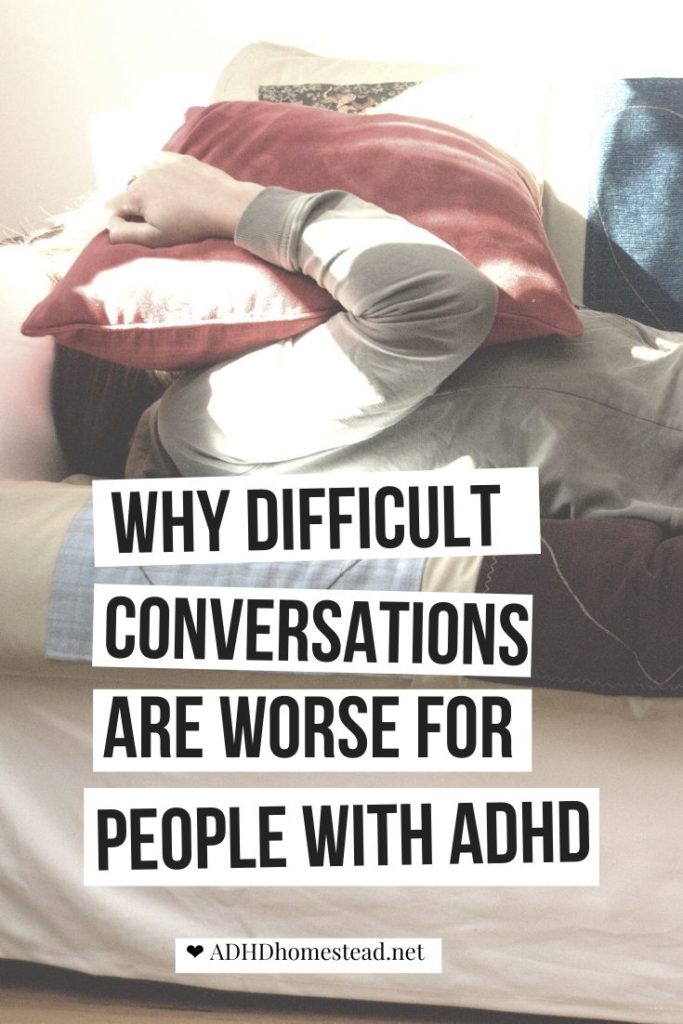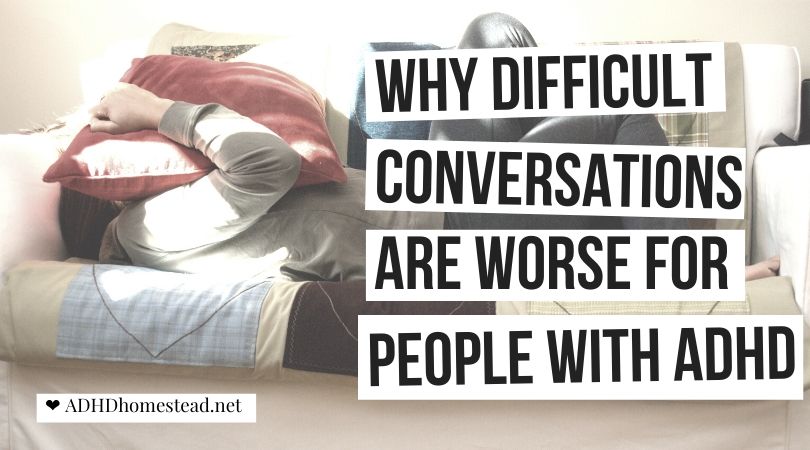Use the player above to listen to the text of this post. To receive expanded versions of new audio posts and other bonus content in your favorite podcast app, become a supporter of The ADHD Homestead on Patreon.

Editor’s note: this post was updated to include audio narration on June 10, 2020.
Difficult conversations — and by that I mean high-stakes, emotionally charged situations — suck for everyone. They’re even worse for people with ADHD. Time-blindness and emotional hyperfocus steal our perspective. We get disproportionately upset. Poor working memory leaves us working sentence to sentence.
This is no way to live. We need to understand what’s going on in our brains, and what we can do about it.
What makes difficult conversations so much harder for someone with ADHD?
Many of our conflict management issues come from lack of perspective. Without proper context for our emotions, or the conflict itself, we spin out of control.
Time-blindness and emotional hyperfocus
ADHD renders us time-blind. We can’t perceive time outside the present moment, or if we can, our perception of time is distorted. When we spiral into anger, shame, or hurt feelings, we can’t feel anything else. We can’t even imagine ourselves feeling anything else.
An argument with a spouse may upset a neurotypical person, but they have a broader perspective. For example: I’m angry with you because you did this thing I don’t like, but our relationship is more than this moment. A person with ADHD only sees this moment. We only feel the pain we’ve caused the other person, or vice versa.
Shame, confusion, and post-hoc justifications
After a big blow-up, we may know, deep down, that our reaction was way out of scale. We may also refuse to admit it.
I wrote a lengthy post about blame-shifting at the request of someone I like a lot. They weren’t the only one suffering from another person’s unmanaged ADHD. That post remains one of my most popular, and routinely brings in new readers from Google searches about ADHD, anger, and blame-shifting.
Whether we do it consciously or not, many people grasp at straws to find a reasonable justification for bad behavior. Anything beats facing reality.
Poor memory
When I get into a conflict, my memory sabotages me at every turn.
Several minutes into an argument, I usually forget the original context for our discussion. I forget what’s been said, even if I was the one who said it. Not only do I get frustrated when someone tries to hold me accountable for my own words, I shift the landscape of the entire discussion. As more words flow in and I forget where we began, the argument becomes about whatever’s in the the front of my mind. This usually ends with all parties feeling confused and angry.
My poor memory leads me to argue in circles at best, and completely lose focus at worst. Once I’ve lost the original thread of the discussion and worn myself out on arguing, I’m keen to forget the whole thing. My attention span for the discussion is shot. I expect people to turn off hurt feelings like a light switch, but it’s not that easy.
How to keep a difficult conversation from spiraling out of control
Out-of-control emotions can be overwhelming — for us and for others. In the heat of the moment, we express ourselves in ways that feel inaccurate (or just plain inappropriate) once the dust settles. On the flip side, our leaky ADHD memory compels us to address issues right now, before we lose our grasp on the situation. Ideally, we should put some distance between the emotional reaction and the conversation about it. For a time-blind ADHDer with a terrible memory, that’s a huge ask.
Take notes!
I need to write everything down. I keep dry erase markers next to my bathroom mirror. Yet it feels awkward to take notes during a social discussion. Ironically, we’re trained to do it in business meetings. Colleagues will more likely judge us for not taking notes. Note-taking demonstrates that we’re listening and we intend to follow up on the items discussed.
Why would we show a coworker this courtesy, but not family and friends? Don’t be shy about taking notes, even if you think it looks weird.
Here are some ways I use note-taking to help me through tough conversations:
- When I feel big emotions rolling in and know I should remove myself from the situation, I take my notebook with me. Writing about my feelings keeps me from projecting them too loudly to others.
- If I can predict a difficult conversation, I write an outline (yes, like your ninth-grade English teacher taught you to do) of how I want the conversation to go. Remember thesis statements? It’s important to know what you want out of a conversation, and what you want the other person to hear.
- I take notes immediately after a conflict: what did I say? What did the other person say? How did I feel? What made me most angry/hurt/sad/frustrated?
- And like I said, I’m not shy about taking notes during a conflict. Notes can quell the urge to interrupt (write it down so I remember to say it at an appropriate time) and help me organize my thoughts and reactions.

Feeling upset and overwhelmed? Get outta there…
I’ve never been good at waiting (big surprise, right?). I consider it a cardinal relationship sin to say, “I have to talk to you about something” — and then try to plan a time other than right now to do it. The dread will eat me alive.
Sometimes it feels like torture, but I’ve learned the hard way over and over again: when emotions run hot, I need to step away. “I always resolve conflict immediately” isn’t always a character strength. It can cause a lot of hurt feelings.
Pulling myself away from a situation to write down and organize my feelings helps a lot (i.e. makes pulling away possible). Once I’m there, I can also calm myself down by imagining myself at a random, low-stakes, unrelated point in the future (see this post for more on the power of imagining your future self).
Waiting until the biggest, most overwhelming emotional reactions have subsided helps prevent me from saying (or yelling) something I’ll regret.
Cognitive state: don’t be afraid to ask, and don’t be offended when asked
During a conflict, questions about our physical or cognitive states are both practical and relevant.
I used to take offense at questions like “are you hungry?” or “did you take your meds yet?” These questions invalidate emotions and diminish the power of our words. They also let the other person know what they’re up against.
I won’t lie, it feels really crappy that this stuff — my most recent snack, or dose of ADHD meds, or even walk around the block — should matter. I hate that it matters. But it does matter, and it matters a lot. Don’t deny the very real effects of hunger, fatigue, or understimulation on our brains. This is prime territory for blame-shifting and increasingly far-flung justifications for bad behavior.
Of course, those who love us ought to recognize and respect these needs, too. Don’t force a difficult conversation late at night, just before mealtime, and/or after meds have worn off, unless it’s truly unavoidable.
ADHDers need special treatment during an argument
If you love someone with ADHD, chances are you’ve fought with someone with ADHD. It’s easy to forget the blinding nature of our emotions. We can wildly overreact in one moment, and forget the whole thing in the next.
There’s one last piece of advice everyone should know about difficult conversations with an ADHDer: affirm other aspects of the relationship, even if you feel like you’re stating the painfully obvious.
We need to hear you still love us. We need reminders about a lot of things you probably assume we remember. We need to hear, explicitly, how this conversation fits into the context of the relationship as a whole (we’re terrible with scale). Otherwise, we’re in an argument that feels like the end of the world, where no one loves us and no one will ever love us, while you’re in a minor disagreement about who should take out the trash. A simple reminder that the rest of the world — and the rest of the relationship — exists can go a long way.
How do you manage conflict with ADHD in the mix? Do you have any tips for keeping things on an even keel? Please share in the comments below!
Hey there! Are you enjoying The ADHD Homestead?
Here's the thing: I don't like ads. I don't want to sell your attention to an advertising service run by the world's biggest data mining company. I also value my integrity and my readers' trust above all, which means I accept very few sponsorships/partnerships.
So I'm asking for your support directly. For the cost of one cup of coffee, you can help keep this site unbiased and ad-free.
Below you will find two buttons. The first lets you join our crew of Patreon pals and pledge monthly support for my work. Patrons also have access to my Audioblogs podcast. The second takes you to a simple donation page to pledge one-time or recurring support for The ADHD Homestead, no frills, no strings. Do whichever feels best for you!

